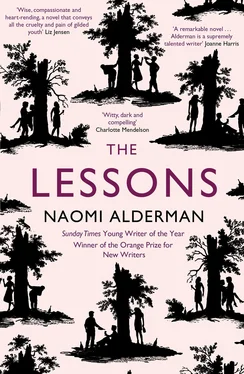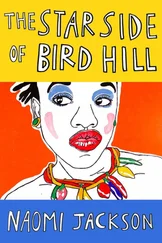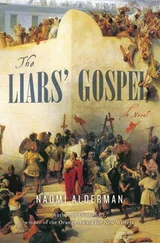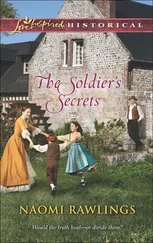At once we were all action, each of us doing something different, loudly, at the same time.
‘Throw him a rope,’ shouted Simon, though we didn’t have a rope.
‘Break off a branch!’ shouted Franny, and tried to do so.
Jess started to wade towards Leo but he was moving too quickly, away, downstream. And while we were dithering, wondering how to fetch help, whether we should take a boat and row out, Mark said nothing. I looked for him and saw him on the bank, tiptoe, hinged over like a half-open penknife. He stood poised like that for a moment, balanced, his toes gripping the bank, his head down. He pushed off cleanly, dropped into the water without a sound and surfaced a few yards downstream, towards Leo.
Leo’s head went down. It did not re-emerge. The seconds elongated while Mark receded, slicing through the water faster than the current. He was a good swimmer; summers spent in the sea by his mother’s Italian house had left him with the compact, muscular shoulders and torso of a strong front crawl. He dived, but came up empty-handed. He looked around, struggling against the current. He dived again and came up cupping a small white head, his arm underneath the chin. We stood on the bank and watched, unable to move or speak.
Mark ran through the shallows and back to the bank with Leo’s small body resting on his shoulder. We ran to him. We couldn’t see whether Leo was moving.
Nicola said, ‘Is he all right? Mark, is he all right?’
Mark laid the boy on the grass. Leo was a ghastly, ghostly grey; no sign of life came from him. Mark put his face close to Leo’s mouth, listening. Then he tipped the boy’s head back and breathed deeply into his lungs. One breath. Another. And suddenly Leo was coughing, choking. He turned to the side and vomited out a great lungful of greenish water, and Nicola said, ‘Oh!’ and dropped to her knees beside Leo, rubbing his chest with her hands and the corners of her skirt.
Mark looked up. His shirt clung to his chest, his trousers were gone, lost somewhere in the river. Blood was pouring from a cut on his temple, near the hairline; he must have struck something underneath the water when he dived.
Franny said, ‘Mark, you’re bleeding. You should …’
He spoke over her. ‘Someone run to get help, for God’s sake! Nicola, fetch the picnic blanket. We need to get him warm.’
Simon ran back towards the main road and the farmhouse, not even stopping to put his shoes back on. Mark stripped Leo out of his clothes, wrapped him in the picnic blanket and hugged him close to his body, rocking him gently, muttering under his breath. All I could think was how shocking it was to see Leo’s nakedness, suddenly, in the midst of a summer picnic, and how pale to the point of blueness his body had been. Nicola knelt beside Mark, rubbing Leo’s hair and holding him with one arm while his teeth chattered and he shook and shuddered.
‘Come here,’ said Mark. ‘Hug him with me, to keep him warm.’ He pulled her across, so that the two of them had Leo’s small body sandwiched between them as they sat face to face. ‘Not too close!’ Mark said. ‘We mustn’t hurt him. Let him breathe.’
Nicola moved back fractionally. Her eyes remained on Mark, wide and frightened. He smiled at her, suddenly — an old Mark smile as if he’d just thought of a wicked joke to tell — and interlaced his fingers with hers. They sat like that, rubbing Leo’s arms and legs, until we heard the siren of the ambulance approaching.
The interview with Rebecca, after we had left Nicola, Mark and David at the hospital, was the most painful of all. The ambulance men had tutted at us, and Simon had shaken while he telephoned his parents from the hospital, but we had not heard their voices, and when they arrived all they wanted was to see Leo and then, when they knew, to thank Mark and thank him again, and tell him again how grateful they were. Nicola would not let Mark go, would not cease holding him though the danger was long gone, and he stayed with her and she stayed by Leo’s bed.
The rest of us had nothing to say to Rebecca. We stood awkwardly in her kitchen while she asked again and again, ‘What were you thinking? What were you thinking, letting a little boy like that climb a tree over the river? Not watching him? Not holding him? What were you thinking?’
She seemed both distraught and genuinely puzzled. But we had no answer for her. We did not know what we’d been thinking and it seemed best to leave.
Jess and I arrived at my parents’ house early in the morning, before either of them was awake. It was 4.30 a.m. and the sky was opalescent, pearl-blue feathered with grey. We kissed in the car for a long time, my hands roving under her sweater and tangled in her hair. She smelled a little sour from lack of sleep and I felt a thread of disgust and reminded myself that I must smell the same.
At last I said goodbye to her and let myself into the silent house. The hallway and the stairs were smaller than I remembered and drained of colour. I had not remembered that the walls of the kitchen were so beige, or that the paper orrery in my bedroom had become so faded and dusty over the years. I could hear my father’s slow snores through the door to my parents’ bedroom. I went to wash my hands and splash water on my face in the bathroom and noticed, for the first time, that there was a dark line of mildew where the basin met the tiles.
My parents had placed a neat white pile of post on my pillow. I took off my shoes and lay down, fully clothed, opening the letters one by one and hoping for sleep to take me at last. There were bank statements, a magazine, a couple of postcards and then a white envelope with an Oxford postmark. I opened it with a sense of exhausted detachment. ‘Mr James Stieff,’ it said, ‘has satisfied the examiners.’ My Prelims result. I had passed. Just barely: one of the marks was a lower second and the others thirds. I stared at the paper. Here, in this room, where I had slaved for my four A-grades at A-level, it seemed like a joke. Sleep was coming on me though in waves of broken images and nonsense thoughts. It washed against my shores, lapping insistently, dissolving me. Still clutching the letter, I let it take me down.
9 Second year, October, two weeks before the start of term
‘Your problem, James,’ said Anne, ‘is that you have no focus.’
Paul, whose face reminded me more of a frog every time I saw him, nodded in silent agreement. He and Anne had driven up from London with a pile of Labour Party posters in the back seat. Paul’s amphibian features looked out sternly from a stack of leaflets headed ‘Paul Probert: Tough on Crime’. I wasn’t sure what good they thought my parents could do with these leaflets, 100 miles from his prospective constituency.
‘I’m sure he’s doing his best,’ ventured my mother.
‘I’m sure he’s not,’ said Anne. ‘He’s wasted his first year at Oxford, totally wasted it, and I’m sorry, James, but you’ll thank me in the end for telling you this. I knew people like you at Wadham. Lazy people. With no ambition.’
Anne had no trouble at all demonstrating her own ambition. She rarely had trouble talking about herself. She’d proudly shown us her Home Office access pass, and her mention in Hansard for excellent work on the regulation of cod-liver oil. Within the year, it appeared, she might be promoted to the giddy heights of Assistant Deputy Vice-Chair of an important committee tasked with investigating soya beans. Fixing me with the beady eye of an Assistant Deputy Vice-Chair addressing a recalcitrant minister, she barked, ‘James! Have you ever even been to the Union?’
‘No, I …’
Anne nodded silently and turned to my parents with a raised eyebrow. I found myself imagining how Mark might react to Anne.
Читать дальше












